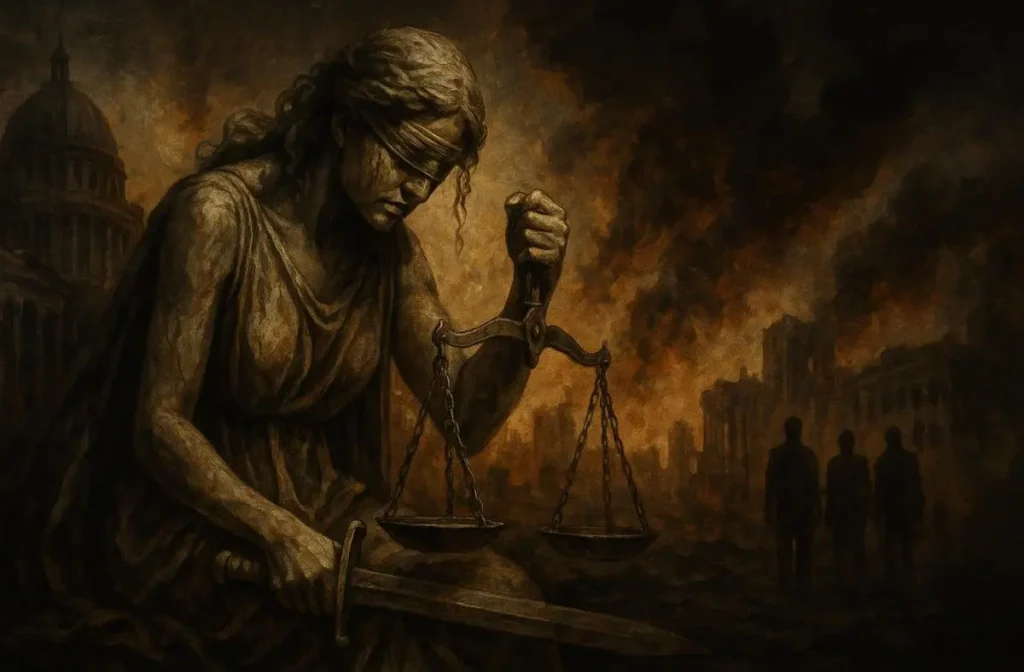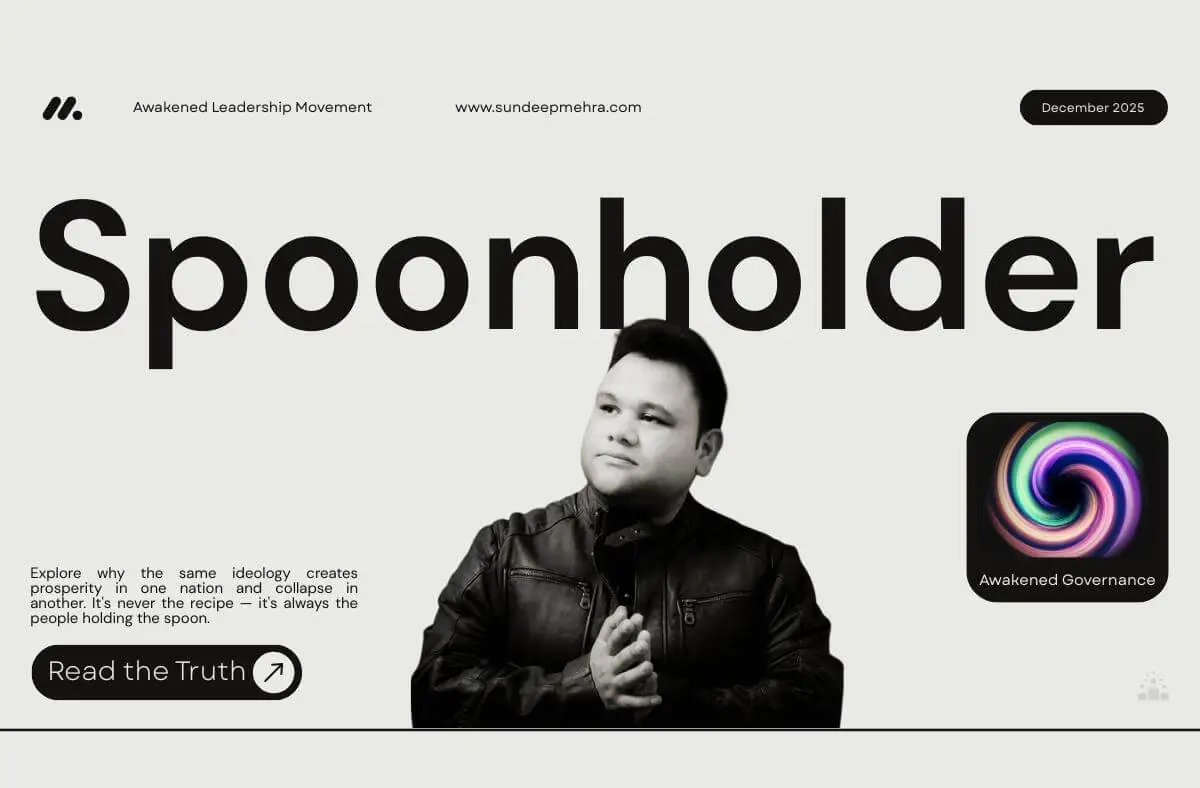
Collapse of Conscience: When Leadership Forgets Equality
Every civilization reaches a point when progress begins to lose its moral memory. Across continents and faiths, societies that speak of advancement still fail the simplest test of conscience: the equal dignity of women. This contradiction between achievement and justice reveals the deepest collapse of conscience of our time.
Leadership that praises innovation while denying equality fractures its own foundation. Governance that excludes cannot be legitimate; its triumphs rest on moral debt. From parliaments to boardrooms, pulpits to classrooms, the absence of women’s rightful presence is a loss of integrity.
Equality defines legitimacy. It measures whether leadership serves a collective purpose or merely preserves privilege. Where equality disappears, civilization begins to imitate progress while its moral architecture erodes from within.
Awakened Governance restores conscience to power. It measures success by clarity of purpose and the dignity it protects. When conscience and equality rise together, leadership regains the moral authority to guide a civilization forward.
Without Conscience, Governance Loses Legitimacy
Conscience is the first architecture of governance. When leadership divorces itself from moral clarity, institutional design becomes performance without authority. Systems that measure success by output alone fail to notice the deeper deficit: a loss of moral stake among citizens. That deficit is the engine of the collapse of conscience.
Leadership grounded in inner truth and awakened clarity secures public trust. Authority without ethical anchoring does not create continuity; it borrows consent through force, ritual, or spectacle. Over time that borrowed consent unravels, and governance legitimacy dissolves into procedural formality.
Conscience as Governance Architecture
Conscience supplies the norms that make laws believable and institutions durable. It turns rules into reasons and procedures into promises. Where conscience erodes, compliance persists but commitment vanishes. Governance legitimacy depends on that commitment.
Early signals of a conscience deficit
- Token representation that masks exclusion.
- Policy wins accompanied by shrinking public trust.
- Ritualised transparency with no change to power relations.
- A rising tolerance for impunity among elites.
These signals precede institutional collapse. Repair begins by restoring moral criteria to decision making. That restoration is the work of Awakened Governance: a systemic policy architecture that measures success by inclusion, dignity, and ethical continuity.
Watch Explainer
Progressive Societies, Regressive Realities
Civilizations often describe equality as an achievement, yet their hierarchies reveal how far conscience still trails behind intellect. The world praises modernity, faith, and knowledge, while its power structures remain bound to habits older than justice itself. The contradiction is universal. Different faces, one moral failure.
The Western Illusion of Progress
Movements for women’s rights have shaped democratic language for more than a century. Yet the corridors of political and corporate power still reveal ceilings that ambition cannot break. Representation expands on paper, while decision-making remains enclosed. What appears as progress often functions as permission, an arrangement that preserves control while celebrating inclusion. This quiet disparity shows how leadership and gender equality have yet to achieve genuine balance.
Devotion Without Justice
Religiously devout societies speak of compassion and divine order while denying women the right to learn, lead, or decide their destiny. Reverence without equality transforms belief into control. The moral contract between faith and fairness collapses, creating an institutional morality crisis that blesses inequality with sacred language.
The Forgotten Legacy of Balance
India once offered the world a vision of knowledge shaped by both genders, a dialogue of intellect and intuition. That heritage now stands in tension with a daily struggle for safety, respect, and representation. Cultural evolution continues, yet the instinct to protect and honour women lags behind. This distance between legacy and practice erodes civilizational legitimacy, reminding the nation to reclaim the collective wisdom that once guided humanity’s moral compass.
A Universal Moral Pattern
The same pattern emerges across continents. Systems that exclude women lose moral gravity. The form of failure changes, but the source remains unchanged, the continuing collapse of conscience. Every nation that treats equality as optional inherits instability. Governance legitimacy endures only where equality and conscience stand together as principles rather than promises.
When Systems Forget Themselves
Power without conscience eventually forgets who it serves. Every structure built on fear begins to mirror that fear until the system itself loses identity. When moral blindness settles in, leadership no longer protects its purpose; it protects its position. This is the silent collapse of conscience that reshapes entire civilizations from within.
The Illusion of Strength
Patriarchal power has long mistaken dominance for direction. Authority is measured by control rather than clarity, and ego becomes the substitute for leadership. Such systems call obedience loyalty and silence stability, but what they defend is fragility, a structure terrified of equality because equality exposes its emptiness.
Faith Without Reflection
Religious institutions often replace humility with performance. Sermons become spectacle, and rituals substitute for reform. The theatre of devotion hides the absence of moral courage. When faith loses reflection, morality becomes an accessory, not a compass. This is how belief turns into control and holiness becomes hierarchy.
Institutions as Mirrors of Fear
Bureaucracies built on hierarchy protect themselves by imitation. Each layer reproduces the insecurity of the one above it. Rules multiply, but responsibility fades. Fear travels faster than accountability, until the system’s original intention disappears behind procedure. The structure survives, but the spirit that created it collapses.
Identity loss in leadership and institutions reflects a human forgetting. Systems that lose awakened clarity stop governing and start managing decline. The conscience deficit in power begins with one lie: strength and clarity are the same. The world’s most enduring institutions are those that remember what they exist for, not those that simply persist.
The Chain of Decline
When leadership loses moral balance, governance begins to fracture. What starts as a private failure of conscience soon becomes a public failure of continuity. A leader who forgets equality creates policies that forget humanity. Over time, that blindness becomes culture, and culture becomes collapse.
Societies guided by unequal principles cannot command trust. They can enforce compliance, but they cannot sustain legitimacy. Each compromise of conscience builds a silent architecture of decay, visible only when institutions start to lose relevance, credibility, and purpose.
How the Collapse Unfolds
- Moral Isolation: Leaders surrounded by agreement instead of truth mistake comfort for consensus.
- Institutional Hollowing: Processes continue while purpose fades; metrics replace meaning.
- Public Disillusionment: Citizens begin to see rules as theatre rather than protection.
- Governance Paralysis: Fear replaces responsibility; decisions serve survival, not progress.
These stages together form the anatomy of decline. The remedy cannot be cosmetic. It begins with moral inclusivity, the decision to lead as a trustee, not as an owner. True continuity depends on whether leadership can expand its circle of dignity to include those long kept at its margins.
Awakened Governance emerges precisely at this junction. It restores conscience to administration, equality to policy, and humanity to law. Its legitimacy is not inherited; it is renewed each time leadership chooses integrity over advantage. Governance legitimacy survives where awakened conscience governs first and authority governs second.
The Data of Decline
Numbers often confirm what conscience already knows. Across the world, institutions charged with advancing equality now record its regression. The data reveals a pattern that policy alone cannot explain: progress without permanence, visibility without power.
Measuring the Backlash
According to recent findings by United Nations agencies, nearly one-quarter of governments report a backlash against women’s rights. The reversal appears in legislation, representation, and funding. Reform fatigue becomes moral indifference when progress is not rooted in conviction.
The World Economic Forum’s latest tracking shows women’s share of leadership edged down to 31.7% in early 2024, and hiring rates of women into leadership have fallen below 2021 levels, signalling a stall in decision-making authority despite broader gains. At the same time, the overall gender gap narrowed by 0.3 percentage points in 2025, yet the world remains 123 years from parity.
The Cost of Ignoring Conscience
- Policy without participation reduces equality to paperwork.
- Representation without respect replaces reform with symbolism.
- Growth without justice widens the gap between legality and legitimacy.
These fractures show that the crisis is not economic or administrative but moral. A civilization cannot govern what it refuses to value. The legitimacy of power now depends on whether leadership sees equality as the foundation of governance or as a decorative ideal.
The world stands at the threshold of a global leadership awakening, a realization that women’s rightful participation is not a metric of fairness but a measure of civilization’s maturity. Nations that resist this awakening will govern through compliance; those that embrace it will govern through awakened conscience.
Awakened Leadership: Restoring the Inner Axis of Power
Every structure that loses clarity begins to mistake movement for progress. When power acts without alignment, the distance between purpose and result widens. The true crisis of civilization is not absence of policy, but absence of inner coherence in those who govern it.
Awakened Leadership begins where governance remembers its foundation. It is the practice of clarity before command, integrity before influence, truth before action. It calls leaders, systems, and societies to awaken to a level of intelligence that is not ideological, but universal. This is awakened clarity, a shared awakened conscience that belongs to no belief, yet sustains all.
Leadership rooted in awakened awareness does not divide morality, politics, and humanity into separate domains. It unites them as one rhythm of legitimacy. When equality and truth converge, governance finds its moral direction. Institutions cease to perform virtue and begin to embody it. The Collapse of Conscience is reversed when awareness becomes structure, not sentiment.
The Architecture of Restoration
- Integrity as governance design: Truth woven into every policy, every decision, every institution.
- Inclusion as legitimacy: Systems regain strength when representation reflects reality.
- Awakened conscience as compass: Decisions guided by universal clarity, not belief or bias.
Awakened Leadership is the discipline of returning systems to their original moral geometry. It is governance that remembers its human design. The work of moral authority and social repair begins wherever leaders choose clarity over confusion and responsibility over rhetoric.
The future of legitimacy will be defined by the presence of awakened leadership, leadership that restores conscience as a systemic principle, not a personal virtue. It recognizes equality as structure, not sentiment, and truth as governance, not philosophy. Such leadership rises to serve the order of truth itself. When leaders awaken, systems remember their purpose. When nations awaken, humanity regains direction.
Awakened Governance: Rebuilding the Architecture of Legitimacy
Every civilization reaches a point where incremental reform no longer restores balance. Systems begin to operate without moral direction, and governance turns into performance instead of purpose. Awakened Governance emerges as the next evolutionary step in leadership, the renewal of structure through awakened clarity. It unites conscience with policy, integrity with institution, and truth with collective order.
Awakened Governance is the practice of building systems that think, feel, and act from coherence. It brings the intelligence of awakened leadership into the language of policy, decision, and diplomacy. It ensures that the design of governance carries the rhythm of awareness that already exists within every awakened leader and every conscious society. Where mechanical governance manages, awakened governance remembers.
This model recognizes that institutions cannot sustain moral legitimacy through compliance alone. They must evolve to reflect the inner architecture of truth that governs all human life. In this evolution, conscience becomes measurable, equality becomes structural, and leadership becomes a reflection of universal clarity rather than ideology.
Arms of Awakened Governance
Each arm of awakened governance represents a dimension of moral restoration. Together, they form the complete anatomy of an awakened civilization, one that integrates purpose, presence, and policy into a single continuum of ethical alignment.
- Awakened Political Governance: Restores the purpose of politics as service to collective clarity. It transforms leadership from competition for power into stewardship of conscience. Political systems regain legitimacy when decision-making reflects awareness rather than ambition.
- Awakened Global Governance: Builds cooperation rooted in shared responsibility. It moves beyond transactions between nations toward alignment of human purpose. Global governance reclaims direction when unity becomes the measure of progress.
- Awakened Diplomacy: Elevates dialogue into an act of truth. It elevates negotiation through communication grounded in understanding. Nations guided by awakened diplomacy recognize that Peace is the presence of shared awakened conscience that guides conflict to resolution.
- Awakened AI Governance: Ensures that intelligence created by humanity reflects the intelligence within humanity. It calls for the alignment of technology with moral clarity, preserving dignity, awareness, and human-first innovation in every algorithm and system.
Together, these arms rebuild governance as an ecosystem of awakened conscience. They return leadership to its rightful place, not as authority over others, but as alignment with truth.
The New Architecture of Legitimacy
Awakened Governance operates through a structural design where morality and mechanism are not separate. It is a complete framework of ethical engineering that defines how institutions sustain coherence.
- Moral Intelligence as Policy Foundation: Every governance model begins with awakened conscience as its first principle. When the moral dimension is embedded within law and policy, integrity becomes systemic rather than optional.
- Equality as Structural DNA: Representation ceases to be symbolic and becomes integral. Institutions reflect the reality they serve, ensuring that leadership, policy, and opportunity are aligned with fairness at every level.
- Integrity as Institutional Energy: Systems gain stability when transparency and accountability are woven into their functioning. Integrity becomes the energy source that sustains continuity and public trust.
- Awakened Conscience as Governing Compass: Decision-making guided by universal clarity becomes self-correcting. Awareness becomes the anchor for governance that can evolve without losing direction.
- Collective Alignment as Civilization’s Core: When the individual, institution, and system operate from the same center of clarity, society regains its rhythm. This alignment restores balance between people and power, between progress and purpose.
Awakened Governance turns legitimacy from a document of compliance into a living moral order. It transforms leadership into a shared state of clarity between those who govern and those who are governed. It is the renewal of conscience as civilization’s highest intelligence, the memory of truth shaping the machinery of power.
Through Awakened Governance, nations rediscover their human design. Institutions begin to act as reflections of awareness rather than mechanisms of control. And societies, guided by awakened clarity, remember that the highest purpose of governance has always been to protect life, preserve dignity, and reflect truth in action.
From Collapse to Continuity: The Global Call
Every civilization reaches a point where power must return to conscience. The world stands at that threshold. Progress without presence has hollowed the meaning of leadership. Systems fail when conscience no longer anchors them.
Equality is the litmus test of leadership and governance. It measures whether institutions, leaders, and nations hold moral authority. Legitimacy follows alignment with truth, justice, and inclusion.
SunDeep Mehra, Global Pioneer of Awakened Leadership and founder of the Awakened Leadership Movement and the Awakened Leadership Constitution, issues a public invitation to nations, governments, institutions, faiths, and civic actors to adopt Awakened Leadership and Awakened Governance as the framework for renewal. Leaders across politics, business, civil society, and religion must rethink how they lead, how they serve, and how their decisions shape the public conscience.
Renewal begins with practical steps: measure moral clarity, embed equality into institutional design, and align policy with enduring human dignity. When conscience becomes the foundation of governance, legitimacy returns to power and civilization regains direction.
For more clarity:
→ Awakened Leadership | What is Awakened Governance
→ Awakened Leadership Complete Guide
Follow SunDeep Mehra on X and LinkedIn to stay updated and aligned with the global leadership awakening movement.
















